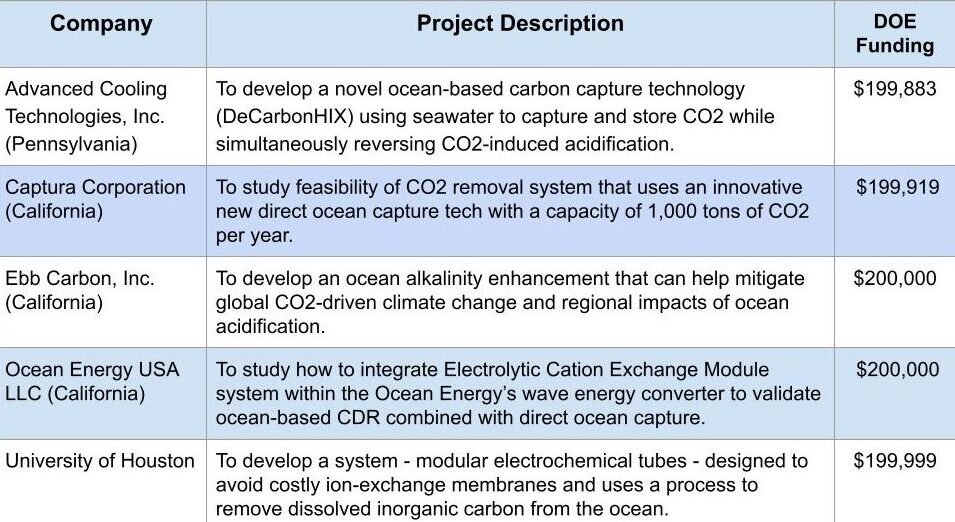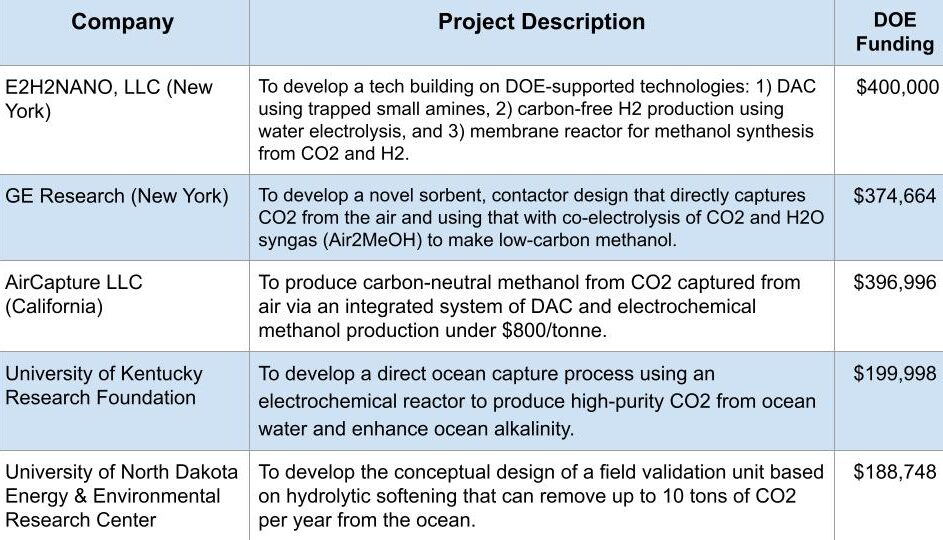The U.S. Department of Energy’s (DOE) Office of Fossil Energy and Carbon Management (FECM) invested over $13 million in 23 projects to support research and development for carbon capture technologies and their applications that can cut carbon emissions.
Universities and private sector companies across the country lead the projects to scale up carbon capture technologies to commercial deployment. These technologies capture CO2 from industrial sources like power plants, or directly from the air and oceans. They then transform the captured carbon into valuable products such as fuels and chemicals or use it to make building materials.
Earlier this year, the DOE rolled out $2.5 billion to fund 2 carbon capture initiatives aimed to boost investment in technologies that capture, transport, and store carbon. The Department also opened new funding opportunities in May worth $2.25 billion for the validation and testing of large-scale, commercial carbon storage projects.
Scaling Up Carbon Capture and Conversion Technologies
The chosen initiatives are helping the nation achieve President Biden’s 2050 net zero economy goal. They also provide high-quality jobs and economic opportunities for local communities. Highlighting the importance of the funded project’s technologies, Assistant Secretary of FECM Brad Crabtree said that:
“Carbon capture and storage, carbon dioxide removal, and carbon conversion will play an essential role in support of our national decarbonization efforts.”
DOE’s financial support aims to bring rapid and widespread adoption of those technologies.
Under round 1 of its funding program, DOE selected 4 projects below to receive a total of over $7 million. These projects convert carbon emissions captured from industrial facilities and power plants into durable building materials like concrete. They can also significantly reduce overall life cycle emissions in the process while focusing on improving the cost efficiency of their processes.
The DOE Funding Program Awardees
-
Calcify LLC – Total Value: $1,716,741
DOE Funding = $1,364,278; Non-DOE Funding = $352,463
The Connecticut-based company will develop a 20 kg/day prototype process using biomass ash and desalination brines to capture carbon. The captured CO2 will be used to make stabilized, amorphous calcium carbonate (ACC) for cement, which the team has to demonstrate to show superior properties to regular Portland cement and emit lower CO2.
-
C-Crete Technologies, LLC – Total Value: $2,500,000
DOE Funding = $2,000,000; Non-DOE Funding = $500,000
The California-based company will demonstrate that their technology is feasible to convert over 10 kg/day of CO2 to make a special formula of high-performance concrete that may outperform Portland concrete while mineralizing the net carbon. Their low-carbon concrete will be fast-curing, carbon-negative, strong and tough and applicable to precast and cast-in-place concrete markets.
-
Cornell University – Total Value: $2,500,000
DOE Funding = $2,000,000; Non-DOE Funding = $500,000
The New York-based university aims to show regenerable carbon capture solvents made through its transformative energy- and atom-efficient technology. The converted CO2 will be integrated for the co-recovery of high-value energy critical metals and other minerals (calcium carbonate, magnesium, iron- and aluminum-rich products) from industrial residues produced by secondary iron and steelmaking as well as aluminum manufacturing.
-
University of Missouri – Total Value: $2,500,000
DOE Funding = $2,000,000; Non-DOE Funding = $500,000
The university will use carbon dioxide to process solid wastes to produce carbon-negative supplementary cementitious materials (SCMs) for construction. In partnership with the Lawrence Livermore National Laboratory, their technology works with various carbon sources, e.g. flue gasses.
The second round of the DOE funding program includes 19 R&D projects that focus on ocean-based carbon removal technologies. Some of them are also into direct air capture (DAC) alongside carbon-free hydrogen to make carbon-neutral methanol.
Other projects are developed by universities as included in the tables.

The DOE’s National Energy Technology Laboratory (NETL) will manage those projects.
These recent selections bring FECM’s total investments of more than $678 million since the funding program launched in 2021. The initiatives promote R&D and deployment of CO2 capture, transport, conversion, and storage.
The recent DOE funding opportunity is crucial in driving technological innovations, economic growth, and job creation during the clean energy transition. The selected innovations, spanning carbon capture to ocean-based removal, signify a stride toward sustainable innovation and significant emission reductions.


